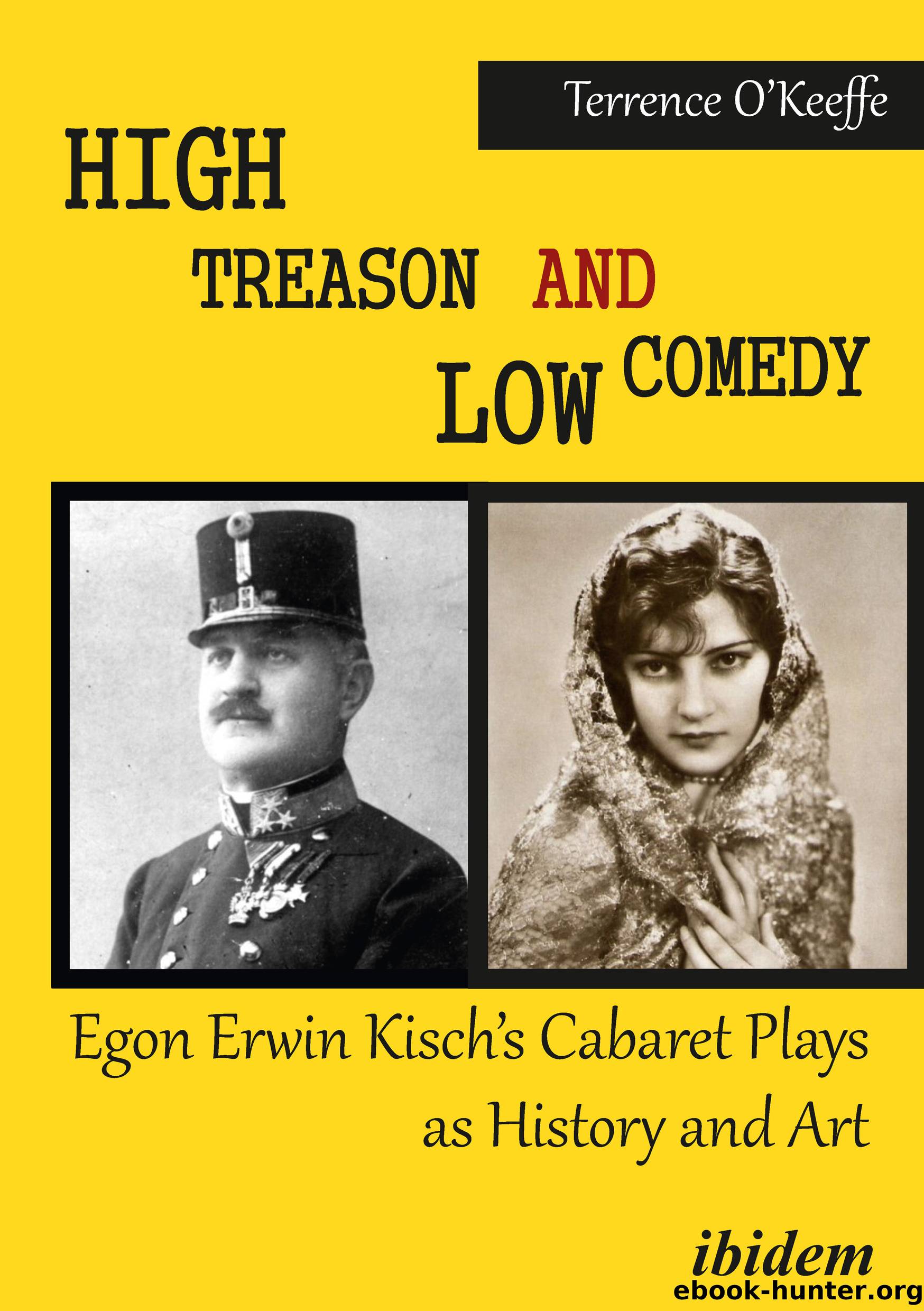High Treason and Low Comedy by Robert T. O'Keeffe

Author:Robert T. O'Keeffe [T., O’Keeffe, Robert]
Language: eng
Format: epub
Publisher: Ibidem Press
Published: 2020-03-19T16:00:00+00:00
Chapter 8. Theatrical Context:
German Playwrights and Weimar Comedy and Cabaret
When Kisch embarked upon his several years of close involvement with E. A. Longen’s Revolutionary Stage in Prague, he was entering a theatrical world that had well-defined conventions but was also being re-organized (and disrupted) by ambitious producers, directors and playwrights who wished to take theater in new directions. The middle-class drama, repeatedly handling the old themes of romantic love, marriage, family conflicts, and (occasionally) the strivings of heroic individuals who wished to set themselves apart from contemporary social constraints, could still find an audience, though it had to take into account current background social conditions and attitudes (i.e., ‘modernity’ influenced all aspects of life). The heroic nationalist drama, which had blossomed on theatrical and operatic stages as part of movements for political and cultural autonomy during the nineteenth century, seemed either pompous or politically unnecessary on account of the results of World War I. Before the war these older types of play already had competitors, as seen in the works of powerful dramatists such as Chekov, Strindberg, Ibsen, and Hauptmann. Their departures involved neither the settings of plays (parlor, home, country estate) nor the social niche of depicted characters, but rather the intensity of their psychological scrutiny.
In Austria and Germany during the years immediately preceding and following the war Arthur Schnitzler and Frank Wedekind come to mind as playwrights whose works can be used as a standard of comparison for their peers and successors. While they shared several decades of Late Habsburg-era experience with Kisch, they were a generation older, exposing them to a rapidly changing set of conditions that had led to the world Kisch knew during his first three decades of life. The 1860s–1870s yielded the failure of liberalism, the rapid growth of separatist nationalism, increasingly strident anti-Semitism, and the emergence of the first inklings of modernism in all the arts. By the 1890s the consolidation of socialism as a parliamentary force had also taken place―these were the new conditions of life when Kisch was growing up and commenced his career. Admittedly, looking at the works of these two dramatists is a highly selective or even forced basis for comparison, but they can stand in for the larger cohort of writers who conducted their careers as playwrights ambitiously and earnestly, which Kisch might have once thought of doing, but in fact never did.
Both of these dramatists looked at existing social fissures and sexual behavior in a frank manner (which their critics called “coarse”, “brutal” or “pornographic”). Their most adventurous works for the stage (Schnitzler’s Reigen, better known as La Ronde, and Wedekind’s “Lulu” plays in both early and late versions) were censored before 1918 and not performed in Germany or Austria until the 1920s. Schnitzler’s novels and novellas had also been assailed by conservative critics for their unseemly dwelling on sexual relations and for their critical appraisal of the damaging absurdities of accepted and admired Austrian social conventions. In a new stream-of-consciousness style (before James Joyce, one should
Download
This site does not store any files on its server. We only index and link to content provided by other sites. Please contact the content providers to delete copyright contents if any and email us, we'll remove relevant links or contents immediately.
Call Me by Your Name by André Aciman(20501)
Ready Player One by Cline Ernest(14645)
How to Be a Bawse: A Guide to Conquering Life by Lilly Singh(7472)
Wiseguy by Nicholas Pileggi(5771)
The Kite Runner by Khaled Hosseini(5170)
On Writing A Memoir of the Craft by Stephen King(4936)
Audition by Ryu Murakami(4924)
The Crown by Robert Lacey(4808)
Call me by your name by Andre Aciman(4676)
Gerald's Game by Stephen King(4642)
Harry Potter and the Cursed Child: The Journey by Harry Potter Theatrical Productions(4503)
Dialogue by Robert McKee(4389)
The Perils of Being Moderately Famous by Soha Ali Khan(4217)
Dynamic Alignment Through Imagery by Eric Franklin(4208)
Apollo 8 by Jeffrey Kluger(3705)
The Inner Game of Tennis by W. Timothy Gallwey(3682)
Seriously... I'm Kidding by Ellen DeGeneres(3629)
How to be Champion: My Autobiography by Sarah Millican(3591)
Darker by E L James(3512)
